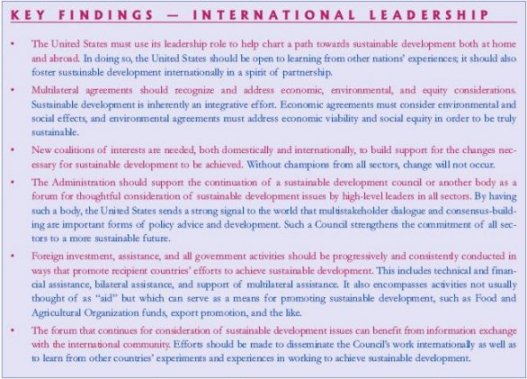International Cities
This aspect of the strategic plan to create a North American Union by dissolving the United States as a nation was by far, the most difficult to get a handle on. The first clue that something wasn't right - at least for this writer was the Kansas City Smart Port and the Kansas City Mayor's Office of International Affairs & Protocol. Upon reflection, to implement the strategy of regionalism which disempowers the traditional U.S. representative government structures, they needed to engage local officials in some way to get them to actively participate in the disintegration of their own power structures - city and county governments and ultimately the disintegration of our nation itself.
Pulling together the story of this front on the war against America was rather like finding a few pieces in a 1,000 piece jigsaw puzzle. Because of that, this section will present those pieces as they were found.
Environmentalism as a Political Change Agent
Recall that even though the plan for the disintegration of the United States as a nation began during Lyndon Johnson's Administration when he signed the "Declaration of the Presidents of the Americas", the merger process didn't begin in seriousness until Ronald Reagan signed the La Paz Agreement with Mexico in 1983 ostensibly to work with Mexico to clean up the environment of the border region. It has become clear that environmentalism is the cancerous seed from which the treasonous plot to dissolve the United States was hatched. This is the beginning point of the story on how America's Mayors and County officials have been drawn into the plan to break apart the United States.
Background
In June of 1993, Bill Clinton signed Executive Order 12852 calling for the creation of the 'President's Council on Sustainable Development' (PCSD). On the surface, the goal for the Council was to develop the strategic plans to preserve the environment. The reality is that 'Sustainable Development' is the "United Nations Agenda 21 plan for communist environmental and social programs with regionalism as the strategic method through which they are being implemented without knowledge or understanding by a majority of the American public and has never been debated by Congress.
In 1996, “The U.S. Environmental Protection Agency joined with several non-profit and government organizations to form the Smart Growth Network (SGN) which is effectively a network of insurgents to infiltrate local communities to guide local officials in the implementation of the United Nations Agenda 21.
Then in 1998, the EPA established the "The Sustainable Development Challenge Grant program. The grant program provided the 'buy-off money' to get local officials to participate.
The PCSD invited "stakeholders" which included City Mayors and County Officials to participate. Professional facilitators using the Delphi Technique led the "stakeholders" down the primrose path from environmental issues to thinking that they must become involved at the international level to save the environment. This strategy was a cannibalizing force to change the mindset of city officials away from thinking as entities of the United States as a nation towards thinking in terms of regions and international associations.
In May of 1999, the PCSD
published a report,
'Towards A Sustainable America: Advancing Prosperity,
Opportunity and a Healthy Environment for the 21st Century".
The purpose of the report was to present the ideas of the
Council and supposedly of the "stakeholders" for
implementing 'Sustainable Development' in the U. S. In
the listed goals, Goal 9 was "International Responsibility".
Chapter 5 contains the detail which includes encouraging
city and county officials to become involved at the
international level.
xxxxxxxxxxxxxxxxxxxxxxxxxxxxxxxxxxxxxxxxxxxxxxxxxxxxxxxxxxxxxxxxxxxxxxx
"Towards A
Sustainable America"
Page 87
KC SmartPort
Origins
1994 NAFTA Superhighway Coalition forms
(NASCO)
1997 NAITCP - International Organization of Mayors and private partners forms
KC SmartPort
Inland Port concept design originates with
MARC -
the Kansas City Metropolitan Planning Organization (MPO)
when they produced the
"Mid-continent TradeWay Study in 1999.
2000 -
U.S. Foreign Trade Zone Board
begins stepped up authorization for preferential treatment
economic zones in the U.S.
"During fiscal 2000,
the Foreign-Trade Zones (FTZ) Board issued 60 formal orders.
The decisions included approvals for 5 new general-purpose
zones and 22 new subzones. Authority was also granted for
the expansion of 16 existing general-purpose zones and 3
subzones."
Mexican Customs in Kansas City
U.S. - Mexico Border Partnership Action Plan
Smart Border: 22 point agreement
World Bank of Cities
In June of 2006, the UN
Habitat organization met in Vancouver, BC.
Kate
Price of Operation Information attended the conference and
reported back the following. I added the links because
at the time of the conference, there was almost nothing
known about this at the time. With consideration for
all the information that is now available, its clear that
the goal is subversive towards national interests and is
intended to reorient loyalties to the communist global
United Nations system.
"The main theme is localization.
The key to localization is decentralization (it's new
meaning). The hook will be the World Bank for
Cities, especially to those nations who still maintain some
resemblance to sovereignty as closing comments demonstrated
by congratulating those who came 'without their flag'.
The other hook is education, in the highest sense of the
term. They exploit the poor and the good will of
caring individuals to place them into shackles; slaves to
the NWO and then call it true freedom." "Land owners are demonized.
The taking of their land in the name of the poor is
glorified without taking into account how land owners work
to acquire land for their own families, to make a
living, and the work they put into achieving the very
goals the poor yell they have a right to. Also,
without taking into account how each individual found
themselves in poverty, whether by deceitful UN policy, their
own corrupt governments or, from lack of personal ambition."
Cities in Transition
(Note: even though there is a disclaimer saying that the
options expressed are those of the author and should not be
attributed to the World Bank, the facts are that the United
Nations and the World Bank are cooperating in implementing
the concepts presented so the disclaimer is meaningless.
xxxxxxxxxxxxxxxxxxxxxxxxxxxxxx
Going back to a
case study
(May 1999) about the Pacific Northwest (regional) Council, it says the following regarding the PCSD leading
activities to subvert city and county governments: *
Tapping Local and Regional Sustainable Development
Efforts
Time
and again, PCSD members note the energy and
excitement they gain from observing on the ground
efforts to put sustainable development into
practice or from engaging individuals in the
PCSD’s work. This excitement generated a desire by
many members to ensure that the council’s work
support and catalyze additional community-based
actions. This has been a theme that has touched
all three phases of the PCSD, and that resulted in
significant “ripple effects,” such as the support
provided by federal agencies to the National
Association of Counties and the U.S. Conference of
Mayors for the creation of the JCSC. Pg 8
[Note: JCSC is the "Joint Center for Sustainable is Communities (JCSC). The JCSC is designed as an information clearinghouse and technical assistance center that supports innovative multi-jurisdictional approaches to community and urban development and also showcases communities that implement or demonstrate PCSD recommendations." pg 6]
* Build Bridges Between Domestic and International Agendas
Another challenge facing the PCSD is finding a way to connect the PCSD’s domestically driven agenda with official U.S. commitments to fulfill Agenda 21. pg 10
Finally, the PCSD’s somewhat sporadic efforts to engage internationally with other councils needs to be more systematic and consistent. To date co-chair Jonathan Lash has carried the banner of the PCSD in forums outside the United States. The international task force needs to institutionalize such interactions in its work. pg 10
Toward the goal of reorienting the focus of U.S. Mayors away from a national focus and part of the United States as a nation, the Aspen Institutes of France and Germany in cooperation with Ambassador Felix Rohatyn and J. Thomas Cochran of the U.S. Conference of Mayors organized an international conference to propagandize U.S. Mayors:
Aspen Transatlantic Mayors Summit April 6-8, 2000
Aspen Institute, "The Fate of National Sovereignty"
The Globalization Strategy: America and Europe in the
Crucible
Global Management
Lyon, France: Webb Opens First Transatlantic Summit of Mayors
"The Twenty-First Century will be the Century of Cities," Conference President Emphasizes
twentieth century the century of nation states, then the twenty-first century will be the century of cities," said Conference President and Denver Mayor Wellington E. Webb, opening the historic first Transatlantic Summit of Mayors in Lyon, France, April 6-8.
and U.S. Mayors together to discuss key issues of globalization
and their impact on the world's cities. In Mayor Webb's words, "The century we have just entered will be the century of cities, reflecting
a renewed faith in cities and a rediscovery of the vitality and richness that has long characterized our great urban centers.
technology, and political reconciliation create unprecedented opportunity for all our citizens," Mayor Webb said. "Our cities will
be both the heart and soul of this historic and global transformation." And "globalization gives us new opportunities for partnership," he stressed.
In addition to Mayor Webb, the U.S. delegation included Mayors
Victor H. Ashe of Knoxville, past President of the Conference of Mayors; H. Brent Coles of Boise, Conference Vice President;
James A. Garner of Hempstead, Conference Trustee; Clarence Harmon of St. Louis; David W. Moore of Beaumont; Marc H.
Morial of New Orleans, Chair, Advisory Board, Conference of
Mayors; Donald L. Plusquellic of Akron; Susan Savage of Tulsa; Sharon Sayles Belton of Minneapolis; and J. Thomas Cochran, Executive Director of the Conference of Mayors.
fact that if we remove our language differences, we see that the
issues we mayors face in common go across both continents and across all counties. Mayor Ashe pointed out the power and
potential of the Internet: "The Internet will change society,"
he noted. The issue is "how to harness changes brought about
by the Internet and make it serve people." Mayor Ashe also noted
that it is much cheaper for him to fly to Europe than to San
Francisco or to Seattle. New Orleans Mayor Marc Morial: "You
Can't Be a Mayor Today Without Having Your Own Foreign Policy"
Glocalization
"Glocalization" is an historical process whereby localities develop direct economic and cultural relationships to the global system through information technologies, bypassing and subverting
traditional power hierarchies like national governments and markets.

